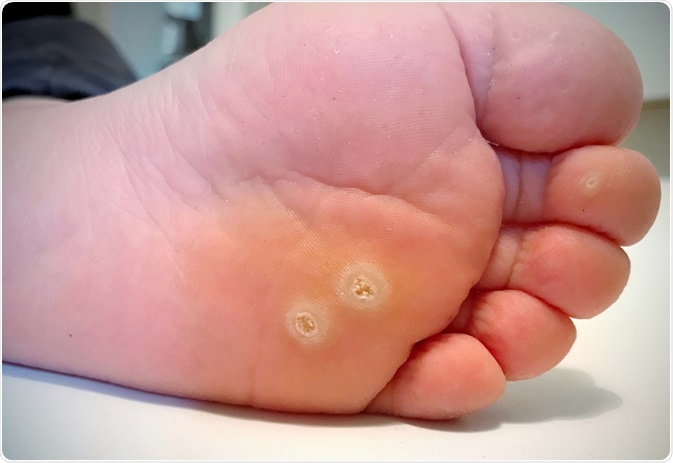There are various types of warts, which are also known as verruca, that affect humans. These include the common wart, flat wart, plantar wart, filiform wart, periungual wart, mosaic wart, and genital wart. Each type of wart has specific characteristics that distinguish them from the other types.

Common wart (Verruca Vulgaris)
Common warts may develop individually or in a small cluster in an area of the body. These warts commonly affect the knuckles, fingers, and knees, but may appear on any part of the body.
Characteristics of the common wart include:
- Round or oval-shaped
- Raised from the skin
- Firm, rough surface
- Variable size, with a diameter within the range of 1 millimeter (mm) to 1 centimeter (cm)
Flat wart (Verruca Plana)
Also known as a plane wart, the flat wart may occur in many areas of the body including the face, neck, hands, wrists, and knees. In contrast to the common wart, flat warts are usually small and flat in shape. These warts can occur on their own as a single wart or in a large crop of several hundred tiny warts together.
Characteristics of flat warts include:
- Smooth, round and flat shape
- Yellow color
- Small with a diameter of 2-4 mm
Flat warts are particularly common in children, and also occur frequently on the legs of women as a result of shaving the legs.
Plantar wart (Verruca Pedis)
Plantar warts tend to develop on the pressure points on the soles of the feet and can often cause pain when walking.

Image Credit: Migren art / Shutterstock.com
Characteristics of the plantar wart include:
- White in color with several black dots in the center.
- Flat shaped
- Painful, particularly when bearing weight.
Filiform wart (Verruca Filiformis)
Filiform warts usually present on the neck or face of individuals, particularly around the mouth, eyes, and nose. These warts resemble a long, thin thread and usually grow in length quickly.
Periungual wart
Periungual warts have a rough appearance and occur under or around fingernails or toenails. These warts can change the shape of the nail, which can also become very painful as a result of the wart.
Mosaic wart
Mosaic warts commonly develop on the hands and feet, usually the palms and soles. A cluster of warts grows together to form a linear tile-like pattern, creating an appearance similar to that of a mosaic.
Genital wart (Verruca Acuminata)
Genital warts refer to warts that develop in the groin, genital, or anal areas. These warts can vary significantly in their size and shape, with some appearing to be flat and white whilst others are bumpy and raised from the skin. In some cases, it is not possible to see warts, despite the presence of the virus and warts.
References
Further Reading
Last Updated: May 11, 2021